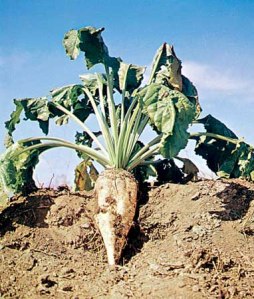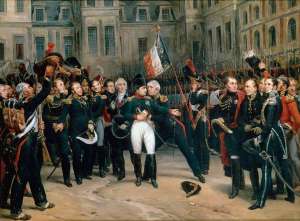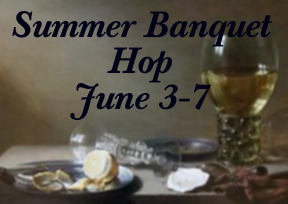No, that’s not a typo. This article is not about Napoleon’s victories on the battle fields of Europe. It’s about his victory in the farmers’ fields in France.
With sugar beets.

Sugar beets (Beta vulgaris) are white, conical roots, with a rosette of leaves above ground. The leaves absorb sunlight and produce sugar by photosynthesis (remember your high school biology?). The sugar is then stored in the root—the part we dig up and process. Sugar beets are grown in temperate climates like Germany, France, the UK, and the northern US, rather than the tropical locales sugar cane prefers.
But what do they have to do with the self-proclaimed Emperor of France?
In 1806 Napoleon attempted to destroy British trade lines and weaken the country by banning the import of British goods into Europe (including those from Britain’s colonies). George III and his Parliament responded by ordering a blockade of all French ports. So the only goods Napoleon and his people were getting (legally) were those they could grow or make themselves. Since all of the sugar in use at the time came from plantations in the West Indies, that meant no sugar for France.
Yikes!
Sugar beets were already known at this time—in the mid-1700’s, a German chemist named Andreas Margraff discovered that the sucrose contained in the beet’s root was indistinguishable from the sucrose in sugar cane. One of Margraff’s students, Franz Karl Achard, later experimented with ways to extract the sugar from beets, and was successful (he’s now considered the father of the sugar beet industry).
So when France found herself sugarless in the first decade of the 1800’s, a starting point already existed for her scientists. In 1809, a commission repeated Achard’s experiments, producing two loaves of beet sugar. One of them was eventually passed on to Napoleon himself, who realized he held the answer to his problem (one of them, anyway). He ordered 32,000 hectares of sugar beets to be sown, and more than 40 small factories were built to process them. In January 1811, the order was upped to 100,000 hectares and licenses were given to build 334 factories throughout the French empire.
In 1813, however, the tide of the war turned. Napoleon was on the run, and the blockade was lifted. Cane sugar once again became readily available, and beet sugar was no longer competitively priced. All of the beet processing factories that had been built in Germany and Austria (part of Napoleon’s territory) were closed down. The following spring the Sixth Coalition defeated the French empire, and Napoleon—champion of the sugar beet—was exiled to the island of Elba.

Then why do we eat beet sugar today?
France never quite gave up on sugar beet refinement. Between 1820 and 1839, the number of factories began to slowly climb again in response to a duty imposed on imported cane sugar. Once again, beet sugar was a cheaper alternative. The production of cane sugar also had an ugly stigma attached—it was only possible on large plantations using slave labor. Sugar beets could be grown and processed right at home, in factories that employed paid workers.
The process of refining sugar beets later became popular in Germany, the UK, Russia, and even spread across the Atlantic to the US. My home state of Michigan is one of eleven states that continue to produce beet sugar today, though the European Union is the world’s largest producer with about 50% of the total. Overall, beet sugar accounts for about 35% of the world’s production.
Beet sugar: just one example of the silver lining on a very dark cloud.
Another silver lining of the Napoleonic Wars? Wounded warrior romance heroes! To celebrate the Summer Banquet Blog Hop, I’m giving away one of my very favorites: a signed, print copy of Grace Burrowes’ The Solider, direct from the author herself!
Leave a comment below to enter: tell me what you learned today, what you really think of Napoleon, who your favorite historical soldier/sailor is, what draws you to this period of history, your obsession with sweets (or wounded warriors!), or whatever else you’d like.
Comments must be left by midnight EDT on June 7, 2013 to be eligible to win. Open worldwide.
Don’t forget to check out the posts and giveaways of all the Hop participants:
- Random Bits of Fascination (Maria Grace)
- Pillings Writing Corner (David Pilling)
- Anna Belfrage
- Debra Brown
- Lauren Gilbert
- Gillian Bagwell
- Julie K. Rose
- Donna Russo Morin
- Regina Jeffers
- Shauna Roberts
- Tinney S. Heath
- Grace Elliot
- Diane Scott Lewis
- Susan Mason-Milks
- Ginger Myrick
- Helen Hollick
- Heather Domin
- Margaret Skea
- Yves Fey
- JL Oakley
- Shannon Winslow
- Evangeline Holland
- Cora Lee (you are here)
- Laura Purcell
- P. O. Dixon
- E.M. Powell
- Sharon Lathan
- Sally Smith O’Rourke
- Allison Bruning
- Violet Bedford
- Sue Millard
—
Sources:
Agribusiness Handbook: Sugar Beets. Food and Agricultural Organization, United Nations. 2009
Agriculture and Rural Development. European Commission. 2013.
Bonaparte, Napoleon. The Berlin Decree. November 21, 1806.
Draycott, A. Philip (editor). Sugar Beet (World Agricultural Series). John Wiley & Sons, 2008.
Harveson, Robert M. “History of Sugarbeet Production and Use.” Crop Watch: Sugarbeets, University of Nebraska-Lincoln. Retrieved electronically May 2013.




Hello Cora. Wonderful post. So interesting. If I remember correctly I think North Dakota is another US state with a major production of sugar beets. We lived there for a time and I remember seeing the trucks full of beets. My favorite sailor is Admiral Nelson. I don’t know much about this time period but I am always interested in learning more. Thank you to Grace for the chance to win her book. jman1985@yahoo.com
LikeLike
North Dakota is on the list, too, Marsha 🙂 I learned to drive on the highway next to those big trucks, and it scared the crap out of me!
I’m glad you enjoyed the post–anytime you have questions about the Georgian/Regency period, you know who to ask 🙂 Thanks for stopping by!
LikeLike
What an interesting article! Thank you – thoroughly enjoyed reading this (and also enjoying the Blog Hop!)
LikeLike
Thanks Helen! This is the kind of thing I wish I’d had more of in my history classes 🙂
LikeLike
When I have spoken of beet sugar in my books, I have had readers “call me” on the idea. I wish I had this article to use as a response.
LikeLike
Ha! Now you have proof if anyone tries it again 🙂
LikeLike
Goodness! I am learning so much at each stop. I never considered what it would be like to have to deal with the issue of no sugar. As to Napoleon, I’m not a fan. I enjoy many Napoleonic War stories both for the Navy and the Army, but no specific hero is my favorite. Thanks for the giveaway opportunity.
LikeLike
I’m so happy you’re learning lots today, Sophia! Makes me excited to visit all the other blogs, too 🙂
I don’t think I’d do all that well without sugar, myself–though we have alternatives now. Even in the midst of an embargo, we could still have cookies and cakes sweetened with Splenda or Truvia 😉
LikeLike
Like others here have said, this blog hop is so educational 🙂 I am obsessed with sweets, I think, but trying to eat more fruit and less chemistry nowadays and it’s working fine for me. I remember we used to grow our own sugar beets back in the day when we had some land!
LikeLike
Summertime definitely makes it easier to eat healthy, though I’m a bit of a sugar fiend year-round 🙂 Thanks for visiting, Riv!
LikeLike
I found this interesting because I’m from Michigan, too, and never knew this! “My home state of Michigan is one of eleven states that continue to produce beet sugar today.” Thanks for the fascinating information on the French and sugar beets.
LikeLike
Welcome fellow Michigander! I knew Michigan was a sugar beet producer in modern times, but I had no idea Napoleon had anything to do with it. I actually heard Alton Brown mention Napoleon and sugar beets on an old episode of Good Eats, and I thought “no way!”. Turned out to be true 🙂
LikeLike
The Napoleon-sugar beet connection was new to me. This is proving to be a very educational blog hop! Thanks for this post.
LikeLike
Hi Tinney! Thanks for stopping by! I didn’t know about Napoleon’s influence on sugar production, either, before this post. So it’s been education for readers and for me 🙂
LikeLike
Add one more to the list of things I didn’t know that I didn’t know! Great post!
LikeLike
Right? I love that I’m learning new stuff each time I visit a blog on this hop 🙂 Thanks for organizing it, Maria!
LikeLike
I love this! Learning such history is right up my alley. I never knew we had Napoleon to thank for sugar from beets. LOL!
LikeLike
Crazy, right? Historical authors are always saying they couldn’t make up things stranger than the truth, and I suppose this is another example 🙂 Thanks for stopping by!
LikeLike
I LOVED reading this post—–very informative, educational, didactic and all about history, which I have a weakness for 🙂 Well-crafted with how all the wonderful elements were interwoven–beets, sugar, war, military history, Napoleon, European history, conquests, US geography 🙂 Meanwhile, I have always admired how Napoleon went from humble beginnings to Emperor—he’s always been someone I like to read about since 6th grade 🙂 As for favorite historical soldier/sailor, I have too many to name, so I’ll just list a few herein: Horatio Nelson, Winston Churchill, Frederick the Great, Prince Eugene of Savoy, Guderian, Moltke, Ulysses S. Grant, and even Harry S. Truman 🙂 I love military history because I’m a military veteran’s wife, and both military history as well as historical fiction make for good reading. Thanks 🙂
LikeLike
Thanks, Marie! I wanted to post something unusual and interesting, and it looks like I nailed it 😀
I’ve never been a fan of Napoleon’s, given that he tried to conquer all of Europe. But I can appreciate his self-made-man quality…and now the attention he paid sugar beets 😉
Give your husband a big thank-you-for-serving hug from me (we’re a military family, too). You’re absolutely right about military and historical fiction–I think the reading is even better when you combine them!
LikeLike
I remember seeing all the sugar beet fields when I visited England. Never knew the sugar beet was because of Napolean.Just saw an exhibit of some of his personal possessions at the Art Gallery of Hamilton.Thank you, for the giveaway!denannduvall@gmail.com
LikeLike
Hi Denise! I grew up among sugar beet fields and never realized they were commercially viable because of Napoleon’s war. Weird how things intersect in history, isn’t it? Thanks for stopping by 😀
LikeLike
Great article, never knew that about the sugar beet! It’s interesting to know what Napoleon did and the impact he made. Thanks for the great giveaway!
kacidesigns AT yahoo DOT com
LikeLike
It’s funny where you learn things–I didn’t know about Napoleon and sugar beets until it was mentioned on an old episode of Good Eats, and I just had to investigate 😀 Thanks for stopping by!
LikeLike